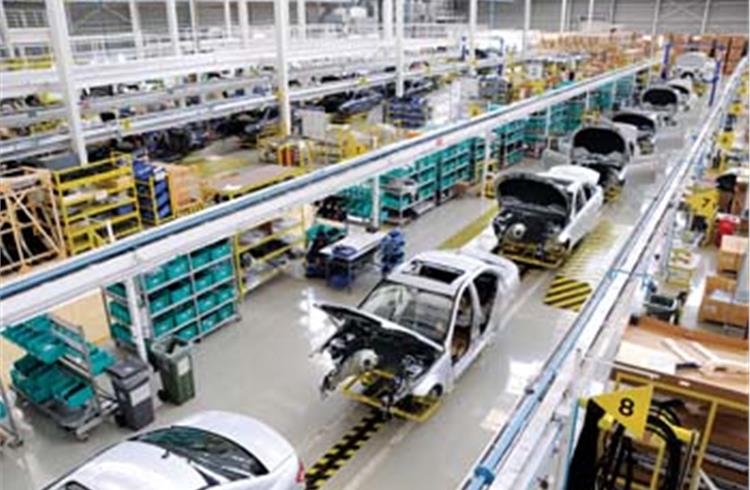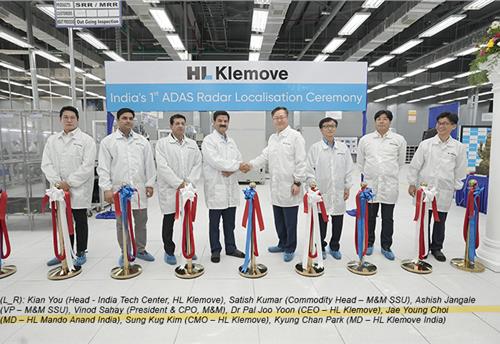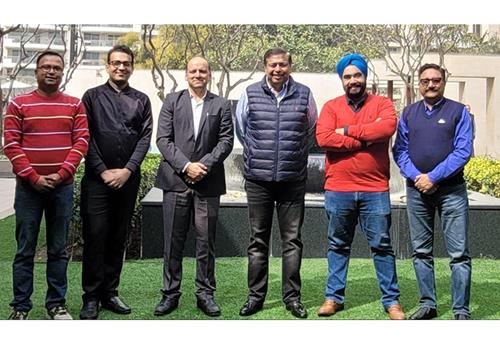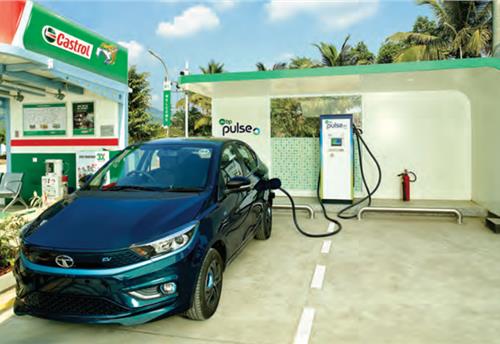Mercedes-Benz opens Chakan plant
Mercedes has invested Rs 300 crore on the plant which is spread over 100-acres and houses an administrative block and assembly plants for passenger cars and commercial vehicles. The current manufacturing capacity is for 5,000 cars and 1,200 trucks and buses a year in single-shift operation.
The company has invested 50 million euros (Rs 300 crore) on developing the 100-acre site, which houses an administrative block and assembly plants for passenger cars and commercial vehicles. The current manufacturing capacity is for 5,000 cars and 1,200 trucks and buses a year in single-shift operation. However the facility has been designed keeping in mind future expansion needs.
Production of C-, E-, and S-class cars, Actros tippers, and coach chassis, which have already begun in January this year, will gradually be expanded to three shifts depending on the demand, according to managing director and CEO Wilfried Aulbur.
Engines and gearboxes for the cars will continue to be assembled by Force Motors under an arrangement MBIL has had with the Indian company since 2000. Likewise, the axles will continue to be sourced from Spicer India.
According to an MBIL source, this simplifies inventory management as both Force and Spicer are responsible for the entire upstream supply chain. A likely additional benefit is the duty advantage on sourcing from a local supplier as opposed to manufacturing these aggregates in-house.
Also, the car bodies will continue to be painted at the Tata paint shop even though the logistics costs of this exercise have increased. This is because the volumes are still far too low for MBIL to justify investment in its own paint shop.
The new plant was completed in a record 13 months from the start of construction in August 2007, and received quality approvals from Germany in January itself, within a month of shifting. In fact the previous plant had received quality awards as the best assembly plant in Mercedes-Benz globally for five consecutive years.
“This plant is even further ahead of the previous one,” MBIL director Dr Eberhard Haller said, going on to highlight its flexibility and scope for expansion. At present the assembly operation is in batches that are multiples of six cars (of one particular model), but the production process is flexible enough to handle a diversity of models and batches of one.
“This factory can produce not only the existing Mercedes product range, but also all other products from the Mercedes stable flexibly on the same assembly lines. We will see many new products roll out in both, the passenger car and commercial vehicle segments,” Haller said.
Autocar Professional understands that the M-class sport utility vehicle could be the first new model series added, though there is no official confirmation of when this will happen. Given the appeal that these vehicles enjoy in India, CKD assembly would help lower the price and boost the popularity of the M-class substantially. The new car assembly line boasts the very latest equipment available globally, including a Zeiss Pro CMM, the latest generation EMS and transfer production line, X-Road dynamic testing and programming equipment, and a shower testing cabin.
The company doubled its sales in India to 3,625 units in 2008, which was comparable to the growth in China but far ahead of the growth in Brazil and Russia, MBIL chairman Dr Joachim Schmidt said: “India is one of the most important markets for us at Daimler and we are convinced of its potential.” However, he admitted that 2009 could be difficult for the company in India and said it was hard to predict whether sales would remain flat or show growth in the current year. Globally he expects a decline of 10 percent in the passenger car segment. The company is looking at the feasibility of setting up its own financing company in order to provide a boost to sales in the Indian market.
“The sky is the limit,” to what a future expansion might look like or involve, Aulbur said, but gave no details.
At present the new facility at Chakan would cater only to the Indian market and Schmidt clarified that there no plans to export vehicles made at this new facility. Since commencing operations in India back in 1995, the company has sold a total of 25,000 cars in India.
RELATED ARTICLES
Branded content: HL Klemove inaugurates first Local ADAS Radar Manufacturing Unit in India, marks a significant achievement in “Make in India” initiative
The inauguration ceremony was held in the presence of Vinod Sahay, President and CPO of Mahindra & Mahindra Ltd. and Dr....
BluWheelz to 'Green Up' logistics sector
With their EVs-as-a-service solution, the startup is playing it smart with costs and looking to electrify the entire seg...
BRANDED CONTENT: Spearheading the EV revolution in India
Jio-bp is a joint venture between Reliance Industries and BP PLC where both entities have married international expertis...





 By Autocar Pro News Desk
By Autocar Pro News Desk
 04 Mar 2009
04 Mar 2009
 34944 Views
34944 Views









